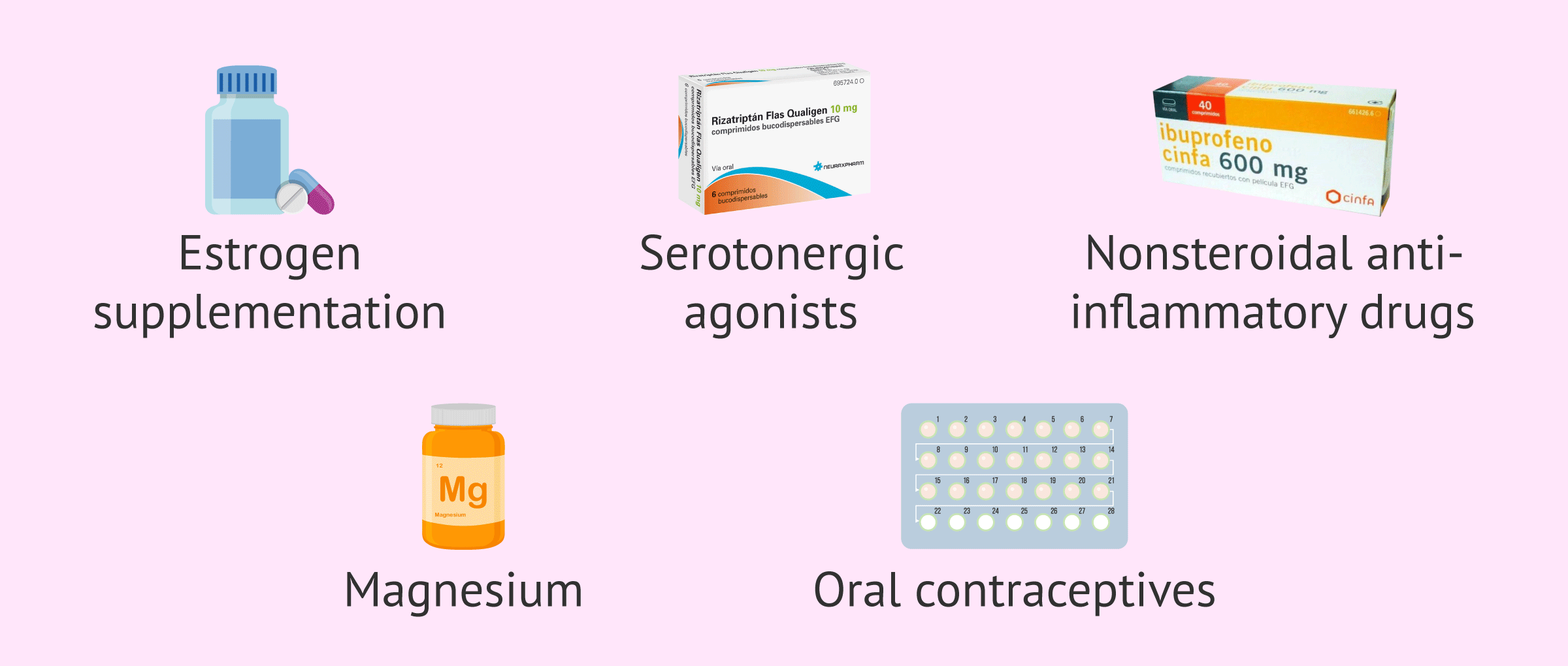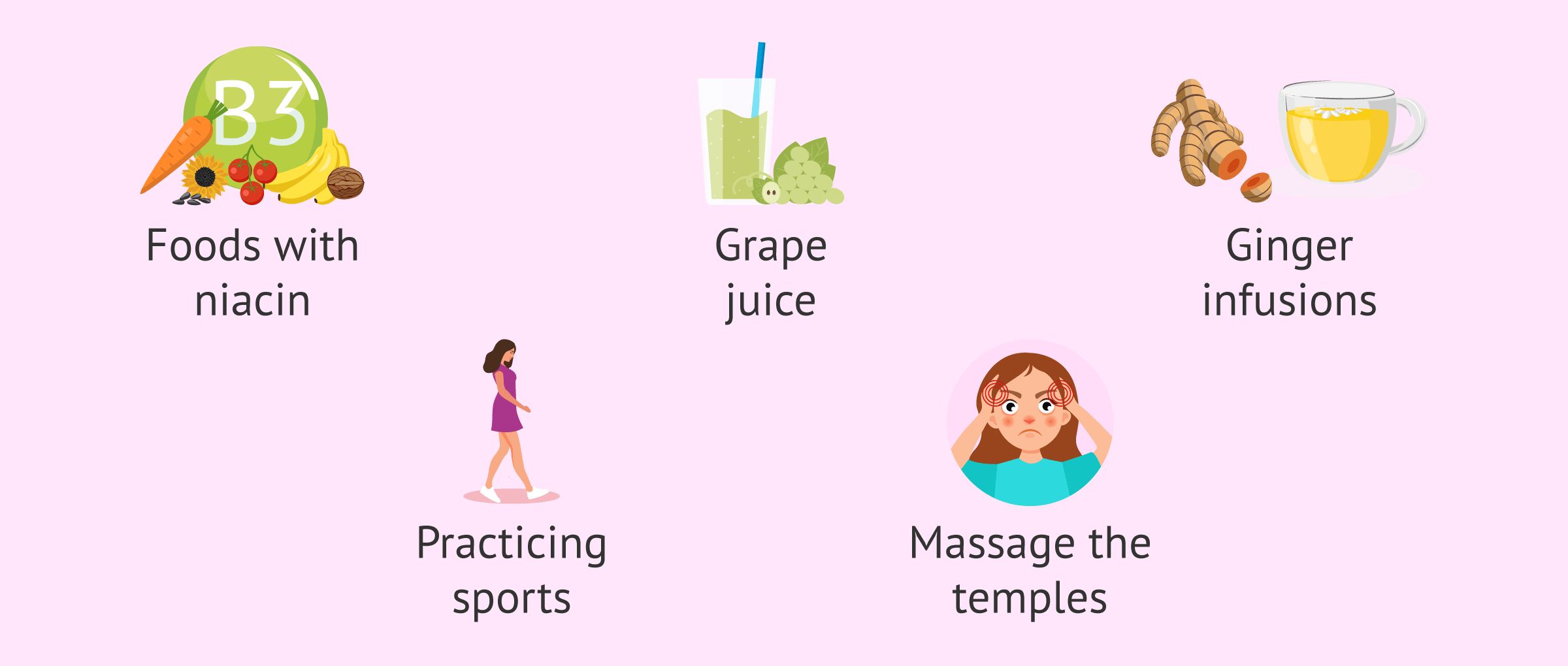In general, migraine is a disease of neurological origin that affects women more than men. The proportion of women of reproductive age who suffer migraine attacks is around 25% and 70% of them are related to the menstrual cycle and hormonal changes.
There are two types of menstrual migraine depending on the time of the cycle at which they appear: pure menstrual migraine and associated menstrual migraine.
In addition to applying the corresponding medical treatment to relieve the throbbing pain characteristic of migraines, you can also carry out some tips such as taking care of your lifestyle, applying ice, massaging the temples, etc.
Provided below is an index with the 7 points we are going to expand on in this article.
- 1.
- 1.1.
- 2.
- 3.
- 3.1.
- 3.2.
- 3.3.
- 4.
- 4.1.
- 4.2.
- 4.3.
- 4.4.
- 5.
- 6.
- 7.
What is menstrual migraine?
Migraine headaches are a type of headache whose incidence is higher in the female population compared to the male population. About a quarter of women of reproductive age suffer from migraines and, of these, 70% of cases are associated with the hormonal changes that occur during the menstrual cycle.
The most characteristic symptom of migraines is throbbing pain that usually occurs on one side of the head, either the right or the left. In addition, when a woman suffers from migraines, she may also experience nausea, vomiting, sensitivity to light or even noise.
Women with migraines in two out of three menstrual cycles, which appear on the days before their period and do not suffer this headache at any other time, are said to have menstrual migraines. Therefore, it is important not to confuse menstrual migraines with headaches, since the latter can also occur during menstruation.
Types of menstrual migraines
Two types of migraine are distinguished: "true menstrual migraine" (pure menstrual migraine) and "migraine associated with menstruation". Each of the modalities is described below:
- Pure or true menstrual migraine
- is defined as a migraine attack with recurrent headaches that may be accompanied by other symptoms and occur regularly only during the two days prior to the onset of menstruation and the first two days of bleeding. Pure menstrual migraine does not occur at any other time during the menstrual cycle.
- Migraine associated with menstruation
- differs from true menstrual migraine in that the migraine attack can occur from two days before menstruation until the last day of menstruation. In addition, migraine associated with menstruation can also occur at other times of the cycle. Therefore, this type of menstrual migraine would be like a pure menstrual migraine, but episodes can also occur throughout the month.
Causes of migraines during menstruation
The onset of menstrual migraine attacks is associated with menarche, the woman's first bleeding, and worsens with subsequent menstrual periods.
Menstrual migraine has its origin in the sudden drop in ovarian steroid (estrogen) levels that occurs after ovulation and before menstruation.
This drop in estrogen is not the only trigger of migraine, estrogens are related to different neurotransmitters such as catecholamines, serotonin, dopamine, endorphins, etc. that may also play an important role in the development of menstrual migraine.
In addition, it is believed that elevated levels of prostaglandins in the uterine endometrium during menstruation can cause headaches.
Treatment of menstrual migraine
Migraines during menstruation do not have a specific treatment; instead, the therapies recommended for people with migraines are used.
The following sections detail each of the treatment options for menstrual migraines.
Preventive therapy
Menstrual migraine can be prevented by stabilizing estrogen levels through estrogen supplements administered cutaneously, transdermally or subcutaneously.
In the short-term prevention of menstrual migraine we find serotonergic agonists, non-steroidal anti-inflammatory drugs (NSAIDs) and magnesium. In long-term prevention, we have hormone therapy and dopaminergic agonists.
There is another therapeutic option for migraine during the menstrual cycle, which consists of taking oral contraceptives (OCP) with low doses of estrogens for 3 or 4 months without a break in order to maintain high estrogen levels throughout the menstrual cycle.
The effects of the contraceptive pill are variable, with some women benefiting and others suffering more intense headaches. This will also depend on the dose of estrogen in the contraceptive.
Acute phase therapy
Medical treatment with drugs is usually necessary especially in the acute phase where migraine is accentuated.
Analgesics and/or non-steroidal anti-inflammatory drugs (NSAIDs) such as naproxen, ketoprofen, ibuprofen, etc. or in combination can be taken to treat pain.
Another effective formula is to take aspirin together with paracetamol and caffeine. The doses will depend on the intensity of the migraine and for them to be effective it is recommended to take them two to three times a day. Factors that may aggravate migraine attacks, such as alcohol consumption and foods containing tyramine such as cheese or phenylethylamine such as chocolates, should also be avoided.
Tyramine is an amino acid that regulates blood pressure, acting as a vasoactivator. This amino acid is present in foods such as cheese, polo liver, prunes, chocolate, etc.
A healthy lifestyle with regular exercise and a regular sleep habit is recommended to prevent migraine attacks.
Home remedies for menstrual migraines
Occasionally, menstrual migraine causes limitations in a woman's daily activities. Therefore, some tips for relieving the discomfort of migraines during menstruation are as follows:
- Take foods with niacin or vitamin B3. Some foods rich in this vitamin are tomatoes, walnuts, sunflower seeds, etc.
- Drinking juice of grapes, cucumber, beet...
- Drink ginger infusions.
- Practicing sports such as walking or running.
- Massage the temples.
In addition to these recommendations, the practice of activities such as yoga or tai chi to relax during the episode of menstrual migraine would also be indicated.
FAQs from users
Do migraines improve during pregnancy?
Yes, migraines can improve and even disappear when a woman becomes pregnant because estrogen levels stabilize after the initial surge in pregnancy. This does not mean that the pregnant woman will not suffer headaches, as tension headaches may continue since they are not related to hormonal changes.
What symptoms does menstrual migraine cause?
The most common symptom of menstrual migraine is throbbing pain on the right or left side of the head. Occasionally, the woman will also feel nausea, vomiting or sensitivity to external factors.
The differences between menstrual migraines and those that occur at other times are that they are recurrent, more prolonged in time and of greater intensity compared to the others.
Does Rizatriptan fight menstrual migraines?
Yes, Rizatriptan is a selective serotonin receptor agonist drug used in patients with migraine attacks. Therefore, Rizatriptan is also indicated in women with migraines during the menstrual cycle to relieve pain.
Can menstrual pain be unbearable?
Yes, some women have very severe menstrual pain and describe it as unbearable. On these occasions, menstrual pain is so intense that it does not allow the woman to sleep or continue with her daily activities, as it does not subside with the usual anti-inflammatory drugs.
In case of unbearable period pain, a specialist should be consulted. The gynecologist will then be able to evaluate the causes and tell the woman what she can take.
Suggested for you
If, in addition to suffering from migraines during menstruation, you are one of those who expel blood clots, then you will be interested in reading this article: Why do blood clots occur during menstruation?
Menstrual pain is also quite common among women. Therefore, we recommend you visit the following link to learn about some remedies to relieve menstrual discomfort: Is menstrual pain normal? Remedies to relieve period pain.
We make a great effort to provide you with the highest quality information.
🙏 Please share this article if you liked it. 💜💜 You help us continue!
References
Anne H Calhoun, Pelin Batur. Combined hormonal contraceptives and migraine: An update on the evidence. Cleve Clin J Med. 2017 Aug;84(8):631-638. doi: 10.3949/ccjm.84a.16033 (View)
Franco Granella. Menstrual migraines. J Headache Pain. 2015 Dec;16(Suppl 1):A23. doi: 10.1186/1129-2377-16-S1-A23 (View)
Munvar Miya Shaik, Siew Hua Gan. Vitamin supplementation as possible prophylactic treatment against migraine with aura and menstrual migraine. Biomed Res Int. 2015:2015:469529. doi: 10.1155/2015/469529. Epub 2015 Feb 28 (View)
Nu Cindy Chai, B Lee Peterlin, Anne H Calhoun. Migraine and estrogen. Curr Opin Neurol. 2014 Jun;27(3):315-24. doi: 10.1097/WCO.0000000000000091 (View)
Rossella E Nappi, Lara Tiranini, Simona Sacco, Eleonora De Matteis, Roberto De Icco, Cristina Tassorelli. Role of Estrogens in Menstrual Migraine. Cells. 2022 Apr 15;11(8):1355. doi: 10.3390/cells11081355 (View)
FAQs from users: 'Do migraines improve during pregnancy?', 'What symptoms does menstrual migraine cause?', 'Does Rizatriptan fight menstrual migraines?' and 'Can menstrual pain be unbearable?'.
Authors and contributors






